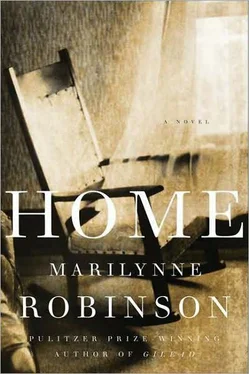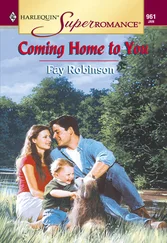So she changed places with him. He held the door for her, ceremoniously, smiling at her, wry and weary. “Thank you so much,” he said.
She looked to see where the pedals were, and the clutch, and then she put the car in gear and it lurched and died, and she tried again and it started. Jack said, “There’s still something wrong with the — with the blasted thing. It doesn’t sound right. This was stupid of me. I knew I should have stayed in town.” He lit a cigarette and rolled down the window.
Glory said, “We’ll be fine,” having no particular grounds for confidence except that as they approached town the houses were less scattered. Rural people might or might not have telephones, but they were certain to have gasoline, and, if it came to that, to have practical experience with balky machines. That is what Jack dreads most, she thought. Having to knock at a door. Out here someone might know about him, without mitigating acquaintance with his estimable father. Well, she would spare him that, one way or another. And the car was running well enough. Her father appeared to be dozing, though still maintaining that statesmanlike expression that meant he could be counted on not to add difficulty to a situation, even by seeming aware of it.
When the DeSoto had brought them home, Jack stood up out of the backseat and stretched, and then opened his father’s door. The old man roused himself. “I will telephone Ames,” he said. “After I’ve had some rest.” He handed Jack his cane. “If you don’t mind, dear. I’m a little bit stiff.” Jack lifted him out by his arm, and then he seemed at a loss how to help him, because his father had made a sharp little cry, and then laughed. “Ouch!” he said. Jack looked at Glory, tired.
She said, “Let me help.” She took her father’s other arm, and they walked him into the house, slowly, carefully. Her helping did nothing to lessen her father’s pain, but it did spare Jack from being the sole immediate cause of it. She took off the old man’s tie and shoes and bundled him into his chair. She went to the kitchen to get him aspirin and a glass of water, and she heard the car start and went out to the porch. She saw the beautiful old plum-colored DeSoto disappear into the barn, and then she heard the barn doors close. When Jack came in, he held the keys out to her.
“It’s your car,” she said.
“I’m making you a gift of it.” He shook the keys so they jingled. “Here. I don’t want the damn thing.”
“Tell me that in a week and I might believe you.”
He dropped the keys on the piano and smiled at her. “Whatever you say, Pigtails.”
She said, “Jack, you can’t leave.”
“Well, I can’t very well stay, can I.” He rubbed his eyes and laughed. “No point in it. I can see myself giving my lady love a tour of the scenes of my youth. Not that she has so many illusions about me. But the few she does have might just be crucial.”
“Maybe they are. Who knows. But we have to think about Papa. We don’t want to kill him.”
“No, we don’t. And if we were to leave, we would be forever alienated from our little sister, on whom we have become surprisingly dependent.”
“Yes, we would. You would. And I mean it, Jack. If I’ve ever meant anything in my life.”
“Such ferocity,” he said, and laughed and rubbed his eyes. “Thank you. A good brisk threat can orient a fellow. But what is this? Now you’re crying!”
She said, “Never mind.”
“You forgive me.”
“Of course.”
He said, “There are all the others, Glory. The old fellow would love to have them around, and they’d be a lot more help to you than I am.” He said, “This might be too hard, you know. I’m not exactly a pillar of strength. And if I went wrong, it would be better if I did it somewhere else. Better for Papa. I do think about that.”
“Yes, you thought about that for twenty years, didn’t you.”
He laughed. “In fact I did. And maybe I wasn’t wrong, Glory. Not altogether wrong.”
“You know more about that than I do. But you said that for ten years you had been all right.”
“That’s true. Almost ten.”
“Then you could at least have come home for Mama’s funeral.” Her voice trembled. “That would have meant so much to him. I’m sorry. I shouldn’t have mentioned it. I don’t know why I did.”
He smiled. “I’m a scoundrel, Glory. Let’s leave it at that.” He said, “I’m sorry. I’m going to have to lie down for a while. Please excuse me.”
“Wait.” She went to him where he stood with his hand on the stair railing, his face so weary, and she kissed his cheek. He laughed.
“Thanks,” he said. “That was kind. That might even help me sleep.”
He slept, and he came down to help set the table for supper. “I can stick around for a while. If that’s still all right.”
“It’s all right,” she said.
He watched a baseball game on television with his father when the dishes were done.

SUNDAY MORNING JACK CAME DOWNSTAIRS DRESSED AND shaved, in his stocking feet, carrying his shoes, to avoid waking his father. He looked at her and shrugged as if to say, What have I got to lose, and she handed him a cup of coffee. He sipped it, leaning against the refrigerator. Then he went to the money drawer and took two dollars. “For the collection plate,” he said softly. “I owe you.” He brushed at the brim of his hat. “Do you mind if I borrow your watch? Then I can take a little walk before the service begins.” She gave him the watch and he glanced at it and then slipped it into his jacket pocket. “Well,” he said, “here goes.” He stopped in the porch to put on his shoes and adjust his hat, and he left.
Half an hour later she heard her father stirring, and she took him his tray of coffee and applesauce and buttered toast and the aspirin tablets with a glass of water. She was still in her robe and slippers and wearing a hairnet. He said, “Aren’t you feeling well, my dear? No church today? Maybe I should call Ames and tell him we’ll have to have dinner another time—”
“No, Papa, I’m fine. I stayed home today so Jack could go.”
“Go to church? Jack?”
“Mmhmm.”
“Jack went to church?”
“Ames’s church. As a gesture of respect, he said.”
“Yes, well, that’s very good. John can give a fine sermon. That new fellow we’ve got now, I’m not so sure about him. I might go to the Congregationalists myself. If I went anywhere. Well.” He laughed. “This is something. This is quite a day.”
He sat perfectly still for a minute, smiling into space, considering. “Just when you’re about to give up entirely! The Lord is wonderful!”
“Maybe you shouldn’t read too much into it, Papa.”
“Read into it! It’s just a fact! You go to church and there you are!” He said, “I thought I must have turned him against it all. I really did. I’ve heard of that in preachers’ families. More than once.”
“Well, he seems to have had some contact with a church in St. Louis. He says he played piano for them.”
“Did he! I wouldn’t know that. He doesn’t talk to me very much. Never did.” He laughed. “Your mother used to ask me, Why do we keep paying for piano lessons for that boy? Because he wouldn’t practice, you know. If you tried to make him, he’d just walk out the door. But I said I thought something might come of it. He’d go to the lessons when Teddy went. Yes. I told her I thought we should treat all the children the same, Jack, too.” He sat there smiling, his face bright with vindication. “It’s wonderful. You make some sort of decision, just a little choice you can’t even quite explain, and years later — Well, I knew he was clever. That was clear to me. He was always paying more attention than he would let on. But I knew it, I did.” He laughed at the thought of his own shrewdness. “Yes.”
Читать дальше













